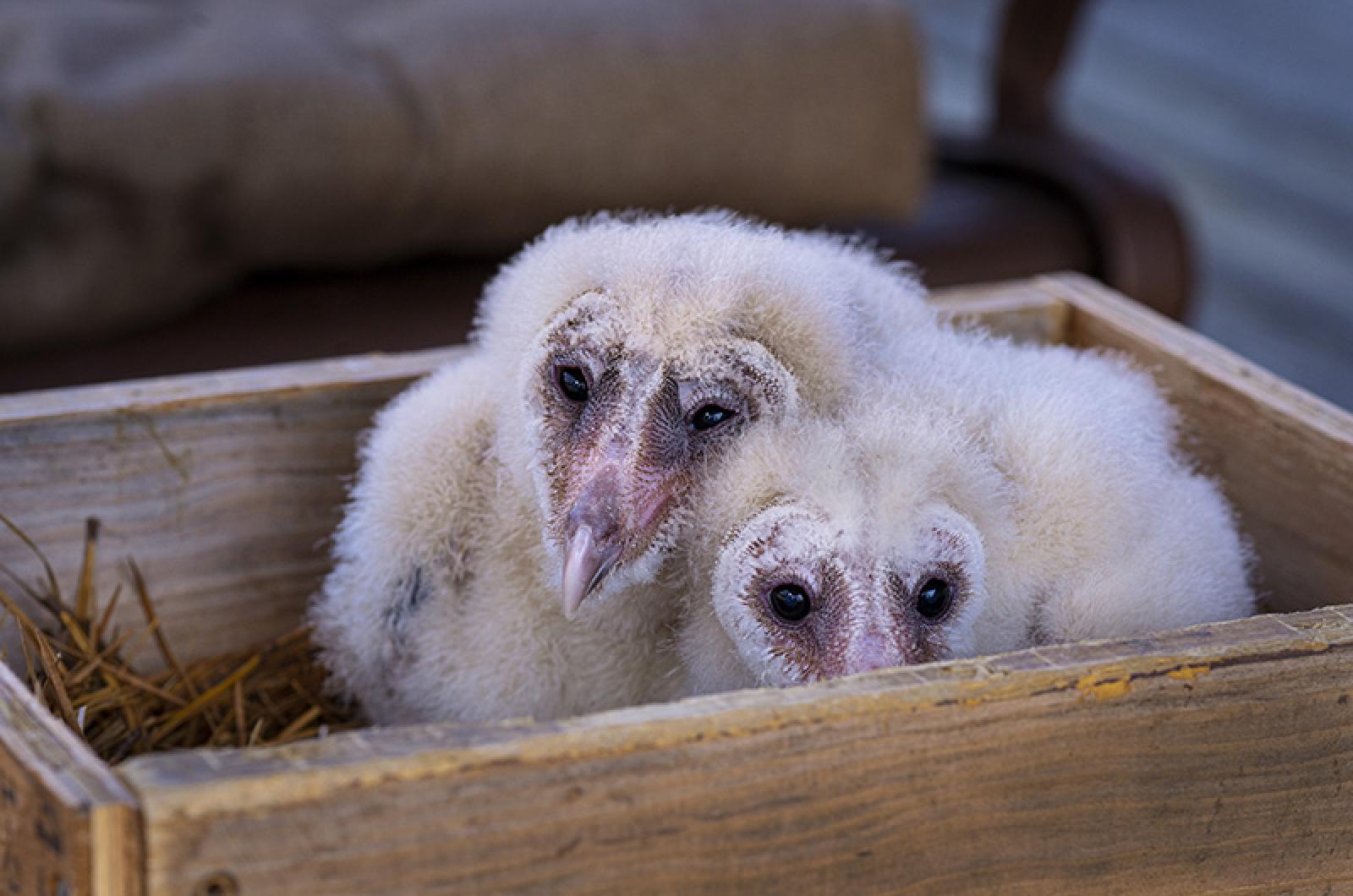Each spring, Gus Ben David makes sure he has a large group of hens in various stage of motherhood. He’s not doing this because he loves chicken eggs and baby chicks, though. He’s maintaining a roster of foster moms.
“I always have a lot of setting hens this time of year for red tail hawks or ospreys. Sometimes if an osprey gets electrocuted, the female who was on the eggs is killed. There are certain circumstances where we have to intervene,” he said.
This spring the chicken intervention came to the rescue of two baby barn owls.
A few weeks ago, Mr. Ben David received a call that a pair of adult barn owls had taken up roost in someone’s living room crawl space.
“The noise they can make, you can’t imagine it,” he said.
Mr. Ben David has a long history as the Vineyard’s wildlife savior and is licensed by federal and state authorities to investigate such matters and take appropriate measures. He visited the home, sent the adult barn owls on their way, and retrieved five owl eggs. After checking the eggs with a bright light to see how far along they were — three days by his estimation, one infertile — he chose the appropriate setting hen and swapped out her eggs for the owl eggs.
The owls took about another 30 days to hatch, with two surviving. Then the real work began for Mr. Ben David and his wife as they took over parenting duties from the chicken.
“You have to hand feed them, every two hours,” Mr. Ben David said. “And you need to flip them from being nocturnal to the daytime to keep up with it.”
The newly hatched owls eat little bits of chopped up mice, just like their owl parents would have fed them. Mr. Ben David keeps a ready supply of mice in various cages around his property, which is also home to all manner of snakes, birds, snapping turtles and other woodland creatures.
The owlets continued to grow and get stronger. They are now about five weeks old, and have graduated to eating a full mouse about four times a day. They are white and fuzzy, with large eyes and a vaguely quizzical expression.
“A common nickname is monkey-faced owls,” Mr. Ben David said. “They are quite extraordinary. They have incredible hearing. Their ears are offset on the sides of their heads, unlike our ears which are level, and so receive sound at different angles and can triangulate this to fly and pounce on a mouse or vole in total darkness.”
At 12 weeks, Mr. Ben David plans to release the owls into the wild. To do this requires no real owl parenting skills, other than the ability to let go. He will not have to teach them to hunt or fly, and they will not wonder about their former parents, the hen or the Ben Davids.
“It’s all instinctive,” he said. “I put their box outside with the door open. And then gradually, when they’re ready to go, they sort of hop around the area. Then they will go back into the box, and after doing this for awhile they will branch and fly off,” he said.
“That’s why you can be so successful rehabilitating barn owls,” he continued. “They don’t they don’t have a tendency to imprint, like raising a young red tail hawk. Ospreys don’t imprint either.”
But that doesn’t mean just anyone should try it. In fact it’s illegal.
“The federal laws are very strict,” Mr. Ben David said. “The average person, if you are out in the woods and you find a red tailed hawk feather, you can’t have even picked that up and have it in your possession.”
Mr. Ben David looks forward to the day he can set the owls free. But in the meantime they will be educating Island children. A group of kindergarteners are about to arrive and learn a thing or two about barn owls. Mr. Ben David retrieves a pellet disgorged by one of the babies. When a mouse is eaten, anything that is not nutritious, the fur and bones, is coughed back up in a pellet about the size of a very large peanut.
“It’s one of the greatest educational tools on the planet,” he said, holding the pellet and breaking it apart. “See the mouse bones. There’s a hip. And there’s a nice skull.”
Asked if the kindergarteners will be given the same demonstration, Mr. Ben David shrugged.
“Maybe. We’ll gauge their mood first.”







Comments (3)
Comments
Comment policy »